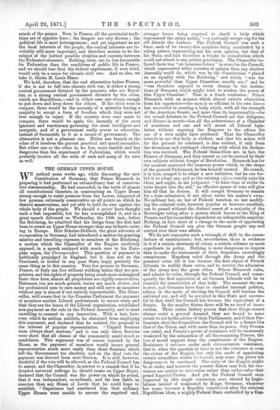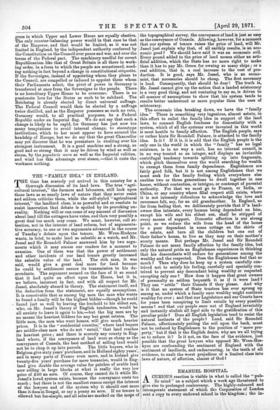THE GERMAN UPPER HOUSE.
WE noticed some weeks ago, while discussing the new Constitution of Germany, that Prince Bismarck in preparing it had performed an extraordinary feat of conserva- tive statesmanship. He had succeeded, in the teeth of almost all constitutional theorists, in constructing an Upper House strong enough to resist pressure from the Lower, composed of few persons, extremely conservative on all points on which he desired conservatism, and yet able to hold its own against the whole body of the people. We should a priori have thought such a feat impossible, but he has accomplished it, and in a great speech delivered on Wednesday, the 19th inst., before the Reichstag, he admitted that his design from the first had been to create an Upper House stronger than any hitherto exist- ing in Europe. Herr Schulze-Delitsch, the great advocate of co-operation in Germany, had introduced a motion for granting salaries and travelling expenses to members of the Reichstag, a motion which the Chancellor of the Empire resolutely opposed, in a speech analyzed with much care in his Euro- pean organ, the Correspondent. This question of payment is habitually prejudged in England, but it does not on the Continent, or indeed in any poor State, imply precisely the same thing as in this country. Very few persons in Germany, France, or Italy can live without working unless they are pro- prietors, and the rights of property being much more endangered there than here, almost all proprietors are rigidly conservative. Distances, too, are much greater, trains are much slower, and for professional men to earn money and still serve as members without pay is almost if not entirely impracticable. The Chan- cellor, well aware that in the Prussian Parliament the payment of members enables Liberal professionals to secure seats, and that they are the bones of the Liberal organization, established non-payment as the rule in the Federal Assembly, and is most unwilling to consent to any innovation. With a tact, how- ever, which he seldom exhibits, he abstained from employing this argument, and declared that he resisted the proposal in the interest of popular representation. "Unpaid Sessions were always short sessions," and it was only when Sessions were short that all classes of the community could stand as candidates. This argument was of course rejected by the House, as the payment of members would secure general representation much more easily than short Sessions, which left the Government too absolute, and on the final vote the payment was decreed from next Session. It is still, however, doubtful if the vote will be allowed, as the Federal Council has to assent, and the Chancellor, in answer to a remark that if he dreaded universal suffrage he should create an Upper House, declared that the Council was the power on which he relied, that it was independent, co-ordinate, and far less liable to coercion than any House of Lords that he could hope to establish, "Experience had convinced him that ordinary Upper Houses were unable to answer the required end, stronger forces being required to check a body which represented the entire nation,"—a curiously savage rap for his old friends the Junkers. The _Federal Council was such a force, each of its twenty-five members being nominated by a ruling prince, representing not his own opinion, but that of his State, and had therefore a weight in consultation which could not attach to any private gentleman. The Chancellor be- lieved there was "an immense future" in store for the Council, which represented wider varieties of opinion than any elective Assembly could do, which was by the Constitution "placed on an equality with the Reichstag," and which "was far more powerful than Upper Chambers usually are ;" and he "was therefore opposed to every change in the institu- tions of Germany which might tend to weaken the power of this Upper Chamber." That is a frank confession. Prince Bismarck, with an acumen which almost extorts admiration from his opponents—the man is so efficient in his own line— has succeeded in creating a body, which, with all the strength of the American Senate, and more than its impersonality—for the actual debaters in the Federal Council are but delegates„ and discuss in secret—has all the subservience of a Chamber of nominees, and can and will arrest all Liberal legis- lation without exposing the Emperor to the odium his use of a veto might have produced. That the Chancellor intends to use this body is evident, and that his action will for the present be condoned, is also evident, if only from the strenuous and continued cheering with which his declara- tion was received. The Federal Councillors are, in fact, the Princes of Germany, and they cannot as yet be coerced by their own subjects without danger of Revolution. Bismarck has for the moment mastered the immense power which, in the shape of the general Parliament, he has himself created. He cannot, it is true, compel it to adopt a new initiative, but he can for- bid it to adopt one, and as the existing re'gime exactly suits his. ideas, and ought, in his judgment, "to have time to strike ita roots deeper into the soil," an effective power of veto will give him all that he desires. It will compel Germany to remain for a time submissive, if not silent under his master's sway. No military law, no law of Federal taxation, no law modify- ing the criminal code, however popular or however excellent, can be passed without the distinct assent of a majority of the Sovereigns voting after a system which leaves to the King of Prussia and his immediate dependents an indisputable majority. Nothing, in fact, short of a change in the mode of appointing the Federal Council can give the German people any real control over their own affairs.
We do not remember each a triumph of skill in the manu- facture of constitutions ; bat, nevertheless, there is evidence in it of a certain shortness of vision, a certain reliance on mere- expedients in policy. Nothing is more dangerous to despots than to make the instrument of their despotism exceedingly conspicuous. Napoleon ruled through the Army and the peasants' votes till it has become the first object of French Liberals to nullify those votes, and to restrict the admission, of the Army into the great cities. Prince Bismarck rules, and admits he rules, through the Federal Council, and conse- quently the first aspiration of all German Liberals will be to- remodel the constitution of that body. The moment the war is over, and Germans have time to consider internal politics, reform in the mode of electing the Council will become the universal cry, and will be accepted in this State and success- ful in that until the Council has become the equivalent of a Senate. In the smaller States there will be no need of insur- rection. Their entire history proves that their Kings cannot always resist a general demand, they are bound to some extent to act bythe advice of their Parliaments, and if their Par- liaments elect the Councillors, the Council will be a Senate like that of the Union, and with more than its power. Only Prussia can resist, and Prussia's power of resistance will be immensely weakened by the submission of all the remaining Princes, the loss of moral support from the constituents of the Empire. Resistance a outrance under such circumstances, resistance, that is, when the question at issue is not the existence or even the status of the Empire, but only the mode of appointing - certain councillors within its bounds, may some day prove too dangerous to be continued. The unity of the Empire might be at stake, and however the present Kaiser may feel, his suc- cessors are certain to over-value rather than under-value that grand Imperial Crown. And yet the Federal Council once improved by this single concession, once elected by Legis- latures instead of nominated by Kings, Germany, whatever her name, becomes a Republic constituted after the strictest Republican ideas, a mighty Federal State controlled by a Con- gross in which Upper and Lower House are equally elective. The only counter-balancing power would in that case be that of the Emperor, and that would be limited, as it was not limited in England, by the independent authority conferred by the Constitution on the Council over peace and war, and over the terms of the Federal pact. The machinery needful for covert Republicanism like that of Great Britain is all there in work- ing order, in a form to which the people are accustomed, need- ing nothing in fact beyond a change in constitutional etiquette. If the Sovereigns, instead of appointing whom they please to the Council, are compelled or induced to appoint those whom their Parliaments select, the pivot of power in Germany is transferred at once from the Sovereigns to the people. There is no hereditary Upper House to be overcome. There is no passionate love for the States as such to be subdued. The Reichstag is already elected by direct universal suffrage. The Federal Council would then be elected by a suffrage twice distilled, and as the Emperor possesses as such no veto, Germany would, to all practical purposes, be a Federal Republic under an Imperial flag. We do not say that such a change is likely to be rapid, for Germany has just now too many temptations to avoid internal change, to stereotype institutions, which to her must appear to have secured the headship of Europe, but we do say that the great Chancellor may yet discover that he was premature in exulting over his strongest instrument. It is a good machine and a strong, so good and so strong that it may be driven by wind as well as steam, by the popularis aura as well as the Imperial volition, and wind has this advantage over steam,—that it costs the workmen nothing.



































 Previous page
Previous page